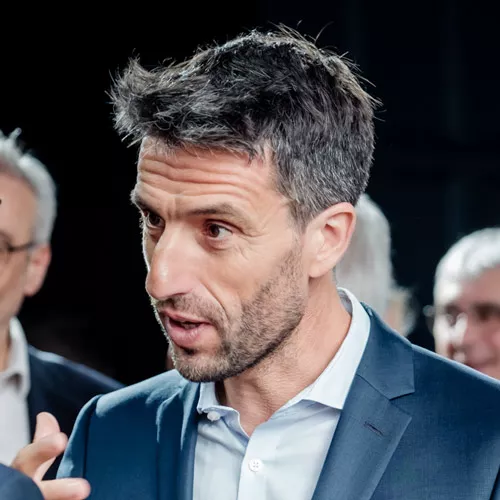Tony Estanguet: “An inspiration for future events.”
The former president of the Paris 2024 Organizing Committee looks back at his successful collaboration with SNCF, and the event’s lasting mark on sustainable mobility.
SNCF Group: Transport and security were critical concerns in the run-up to the Paris 2024 Olympics and Paralympics. Looking back, both were hailed as an outstanding success by one and all. What key factors were responsible?
Tony Estanguet: Ensuring smooth transport and security was absolutely essential for the success of the Games. And both were massive challenges on an Olympic and Paralympic scale, since we had around 4 million people travelling to and from venues every day, and 1,000 events to secure. To handle numbers like that, we adopted a clear approach and worked closely with all of our key stakeholders.
SNCF Group: Can you describe that approach?
T.E.: We focused on three priorities, starting with anticipation—understanding the event’s global needs so we could plan ahead and put the right systems in place. Then came coordination—working closely with all stakeholders, including transport operators like SNCF, to offer an efficient and effective transport system. Finally, expertise—bringing in the very best in the field, like SNCF, a major force in sustainable mobility in France.
This structured approach was crucial. But the real key to the Games’ success was the rock-solid commitment of major partners like SNCF, to delivering on their promise.

Thanks to the commitment of partners like SNCF, we rolled out sustainable mobility solutions that will leave a lasting mark—not just as milestones for these Games, but as an inspiration for future events.
Former president of the Paris 2024 Organising Committee
SNCF Group: On the security front, how would you sum up your collaboration with SNCF Group—especially when major high-speed lines were sabotaged just before the Games started?
T.E.: We already knew that SNCF had vast experience and expertise in crisis and contingency management. But when those attacks occurred—on the day of the Opening Ceremony itself—SNCF went above and beyond the call of duty to respond. Together, our operational teams stepped up immediately to ensure that athletes, delegations and officials who absolutely had to be at the ceremony got there safely. Once that was under control, we assessed the situation and found solutions for everyone else who was affected. That close collaboration between SNCF and the Paris 2024 teams made all the difference. By working together, we were able to come up with effective, phased solutions that responded to the challenges as they unfolded.
SNCF Group: Before the Games, there was a strong commitment to making sure everyone—including people with reduced mobility—could reach all Olympic venues by public transport. How did your Organizing Committee work with SNCF to achieve this?
T.E.: This was France’s first time hosting the Summer Paralympic Games, and we saw it as an opportunity to push for greater inclusion and accessibility—not just for the Games, but as a lasting improvement for the people of France. SNCF got on board immediately, aligning with our vision and putting forward an action plant to make it a reality. Our teams worked closely together to ensure that every route—from arrival by public transport to the actual competition venues—was fully accessible. Dedicated working groups played a key role in preparing and upgrading access at stations serving sites throughout the Paris region, via the Transilien commuter network, as well as in major Paris stations, where hundreds of thousands of eager fans arrived to attend events. But these upgrades didn’t just benefit spectators during the Games: they’re now part of the long-term legacy of Paris 2024, with SNCF making a major contribution.
SNCF Group: What lessons from this approach to sustainable mobility could be applied to major events in the future?
T.E.: With the Paris 2024 Games, we proved that it’s possible to organize events that are both spectacular and responsible. Making public transport a central part of the plan was a game-changer. Thanks to the commitment of partners like SNCF, we rolled out sustainable mobility solutions that will leave a lasting mark—not just as milestones for these Games, but as an inspiration for future events. I have no doubt that this strong commitment to sustainable transport will serve as a model for other major event organizers in the years to come.
Share the article